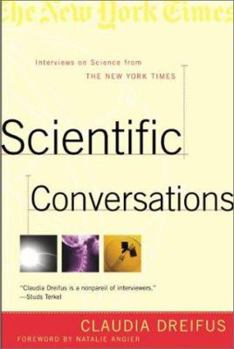Scientific Conversations: Interviews on Science from the New York Times
Select Format
Select Condition 
Book Overview
Dr. Benjamin Carson, a pediatric neurosurgeon, describes what it feels like to dig around in someone's brain. Dr. Leon Lederman, Nobel laureate, displays the wry humor that has earned him the title... This description may be from another edition of this product.
Format:Paperback
Language:English
ISBN:0805071806
ISBN13:9780805071801
Release Date:October 2002
Publisher:Holt McDougal
Length:272 Pages
Weight:0.85 lbs.
Dimensions:0.7" x 5.8" x 8.9"
Customer Reviews
5 ratings
Thumb-nail sketches on the cutting edge of science
Published by Thriftbooks.com User , 22 years ago
This collection of interviews from the New York Times by one-time political journalist Claudia Dreifus works well as an introduction to various areas of current scientific interest. Each of the 38 conversations (11 with women) includes a two and a quarter by one and a half inch black and white photo of the interviewee, an introduction, some Q and A, and a postscript in which Dreifus reports on a follow-up. The persons being conversed with are mostly scientists, but there are medical practitioners, a couple of politicians, an AIDS victim, and some administrators. There are some superstars (Martin Rees, Arthur C. Clarke, Freeman Dyson, Stephen Jay Gould, Roger Penrose) and some others who are not very well known outside their area of expertise (e.g., Luis F. Baptista, Birute Galdikas), and still others who are perhaps best known for being in the public eye (Princess Diana's psychiatrist, Susie Orbach; National Public Radio's Ira Flatow; maverick science writer John Horgan). One has the sense that the conversations have been distilled from a larger essence.The most striking interview is with Dr. Nawal M. Nour, a Sudanese-born gynecologist who treats African-American women in the Boston area who have been mutilated by so-called "female circumcision." Dreifus asks Nour if "These operations" are used "as a means of social control." Dr. Nour's surprising response is that "the people who are perpetuating the practice are usually the women themselves." She adds, "I find that people do it because of a deeply ingrained belief that they are protecting their daughters. This not done to be hurtful, but out of love." (pp 171-172) Dr. Nour's prescription is to dispel such grotesque ignorance with education.One of the most interesting interviews is with medical researcher Polly Matzinger, whom I've read about elsewhere. She is the ex-Playboy bunny and waitress who famously began her scientific career when a UC Berkeley professor, Robert Swampty Schwab, to whom she was serving beer, realized her talent after hearing her ask, "Why has no animal ever mimicked a skunk?" She is currently a leading proponent of the exciting idea that it is not "self" and "non-self" that our immune system distinguishes between, but instead between the benign and the dangerous. This is a radical idea that is "turning the world of immunology upside down." (p. 191)Perhaps the most unusual "scientist" interviewed (at least in terms of his occupation) is self-styled "forensic mathematician" Charles Brenner. He does the mathematical calculations necessary to analyze DNA evidence.The interview with physicist Freeman J. Dyson is interesting mainly because Dreifus got him to voice lukewarm support for the idea that Werner Heisenberg, Hitler's most talented physicist (and subject of the recent play Copenhagen) in part kept the bomb from the Nazis by not giving the project "the kind of push it needed." Dreifus also elicited Dyson's opposition to Bush's new Strategic Defense Initiati
The best cocktail party
Published by Thriftbooks.com User , 22 years ago
What comes through loud and clear from Dreifus's interviews is how much fun her subjects are having doing cutting-edge science. They love their work and love talking about it, and Dreifus manages to convey their enthusiasm to the reader, incidentally passing on a good bit of information from the scientific frontier. You're hooked from the beginning, when Dreifus asks Sir Martin Rees, the Astronomer Royal of Great Britain, "So what's your sign?" Think of this as the best cocktail party you've ever been to.
Very interesting reading--highly recommended!
Published by Thriftbooks.com User , 22 years ago
Claudia Dreifus has done a tremendous job in compiling interviews from a vast array of scientists of various expertise. The interviews are generally provacative and allow the reader (better than any other book of this kind that I have read) to understand the mind and passions of the scientists. Very highly recommended!!!
Science Made Easy and Fun
Published by Thriftbooks.com User , 22 years ago
This upbeat book about thirty eight fascinating figures in contemporary science, makes their universe accessible to the outsider. The pieces are easy to get in to, witty and--dare one say it?--FUN. Suggestion: this is the book for a young person interested in a science career--as well as for routine science buffs.
Probing the Scientist
Published by Thriftbooks.com User , 22 years ago
An exploration of our great scientists from the unique perspective of a New York Times writer. Dreifus's knack is to draw out her interviewees and distill complex subjects into compelling, easily understood science. I never miss her interviews in Science Times.






